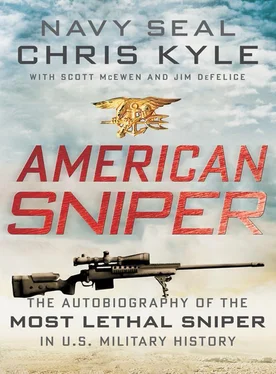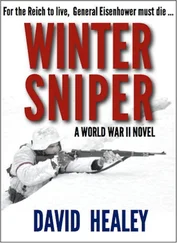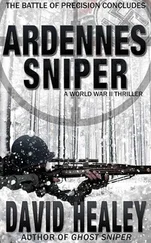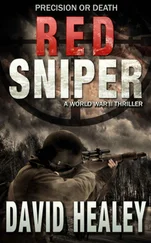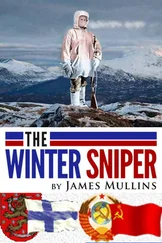Aside from my rank and experience, the head shed wanted me involved in planning, because snipers were taking a more aggressive role in battle. We had become, in military terms, a force multiplier, able to do a lot more than you might think based on our sheer numbers alone.
Most planning decisions involved details like the best houses to take for overwatch, the route to take in, how we’d be dropped off, what we would do after the initial houses were taken, etc. Some of the decisions could be very subtle. How you get to a sniper hide, for example. The preference would be to get there as stealthily as possible. That might suggest walking in, as we had in some of the villages. But you don’t want to walk through narrow alleys where there’s a lot of trash—too much noise, too many chances for an IED or an ambush.
There’s a misperception among the general public that SpecOp troops always parachute or fast-rope into a trouble zone. While we certainly do both where appropriate, we didn’t fly into any of the areas in Ramadi. Helicopters do have certain advantages, speed and the ability to travel relatively long distances being one of them. But they’re also loud and attract attention in an urban environment. And they’re relatively easy targets to shoot down.
In this case, coming in by water made a great deal of sense, because of the way Ramadi is laid out and where the target was located. It allowed us to get to a spot near the target area stealthily, comparatively quickly, and with less chance of contact than the overland routes. But that decision led to an unexpected problem—we had no boats.
Ordinarily, SEALs work with Special Boat Teams, known at the time and in the past as Special Boat Units, or SBUs. Same mission, different name. They drive the fast boats that insert SEALs and then retrieve them; we were rescued by one when we were “lost” on the California coast during training.
There was a bit of friction between SEALs and SBUs back home in the bars, where you’d occasionally hear some SBU members claiming to be SEALs. Team guys would think, and sometimes say, that’s like a taxi driver claiming to be a movie star because he drove someone to the studio.
Whatever. There are some damn good guys out there. The last thing we need is to be picking fights with the people who are supporting us.
But that’s a point that works both ways. Our problem in Ramadi came from the fact the unit that was supposed to be working with us refused to help.
They told us they were too important to be working with us. In fact, they claimed to be standing by for a unit with a higher priority, just in case they were needed. Which they weren’t.
Hey, sorry. I’m pretty sure their job was to help whoever needed it, but whatever. We hunted around and found a Marine unit that was equipped with SURC boats—small, shallow-draft vessels that could get right up to the shore. They were armored and equipped with machine guns fore and aft.
The guys driving them were bad-ass. They did everything an SBU was supposed to do. Except that they did it for us.
They knew their mission. They didn’t pretend to be someone else. They just wanted to get us there, the safest way possible. And when our mission was done, they came for us—even if it was a hot extract. These Marines would come in a heartbeat.
The Army rolled in with tanks, armored vehicles, and trucks. Soldiers humped sandbags and reinforced weak spots in the house. The house we were on was at the corner of a T-intersection of two major roads, one of which we called Sunset. The Army wanted the spot because of its strategic location; it was a choke point and a pretty clear presence inside the city.
Those factors also made it a prime target.
The tanks drew attention right away. A couple of insurgents began moving toward the house as they arrived. The bad guys were armed with AKs, maybe foolishly thinking they could scare the armor off. I waited until they were two hundred yards from the tanks before picking them off. They were easy shots, nailed before they could coordinate an organized attack.
Afew hours passed. I kept finding shots—the insurgents were probing the area, one or two at a time, trying to sneak in behind us.
It was never hot and heavy, but there was a steady stream of opportunity. Pop shots, I called them later.
The Army commander estimated we got two dozen insurgents in the first twelve hours of the fight. I don’t know how accurate that is, but I did take down a few myself that first day, each with one shot. It wasn’t particularly great shooting—they were all around four hundred yards and less. The .300 Win Mag is a hard-hitter at that range.
While it was still dark, the Army now had enough defenses at Falcon to hold their own if they were attacked. I went down off the roof and with my boys moved out again, running toward a rundown apartment building a few hundred yards away. The building, one of the tallest around, had a good vantage not only on Falcon but on the rest of the area. We called it Four Story; it would end up being a home away from home for much of the battle that followed.
We got in without trouble. It was empty.
We didn’t see much for the rest of the night. But when the sun came up, so did the bad guys.
They targeted COP Falcon, but ineptly. They’d walk, drive, ride mopeds, trying to get close enough to launch an attack. It was always obvious what they were doing: you’d see a couple of guys on a moped. The first would have an AK and the second would have a grenade launcher.
I mean, come on.
We started getting a lot of shots. Four Story was a great sniper hide. It was the tallest building around, and you couldn’t get close enough to shoot at it without exposing yourself. It was easy to pick an attacker off. Dauber says we took twenty-three guys in the first twenty-four hours we were there; in the days that followed, we’d get plenty more targets.
Of course, after the first shot, it was a fighting position, not a sniper hide. But in a way, I didn’t mind being attacked—the insurgents were just making it easier for me to kill them.
If the action around COP Iron had been dull to none, the action around COP Falcon was the exact opposite: intense and thick. The Army camp was a clear threat to the insurgents, and they wanted it gone.
A flood of bad guys came at us. That only made it easier for us to defeat them.
Very shortly after Ramadi started, I reached a huge milestone for a sniper: I got my 100th and my 101st confirmed kills for that deployment. One of the guys took a photo of me for posterity, holding up the brass.
There was a little bit of a competition between myself and some of the other snipers during this deployment, to see who got the most kills. Not that we had all that much to do with the numbers—they were more a product of how many targets we had to shoot at. It’s just the luck of the draw—you want to have the highest numbers, but there’s not much you can do about it.
I did want to be the top sniper. At first, there were three of us who had the most kills; then two of us started pulling away. My “competition” was in my sister platoon, working on the east side of the city. His totals shot up at one point, pulling ahead.
Our big boss man happened to be on our side of the city, and he was keeping track of how the platoons were doing. As part of that, he had the sniper totals. He tweaked me a little as the other sniper pulled in front.
“He’s gonna break your record,” he’d tease. “You better get on that gun more.”
Well, things evened out real fast—all of a sudden I seemed to have every stinkin’ bad guy in the city running across my scope. My totals shot up, and there was no catchin’ me.
Читать дальше
